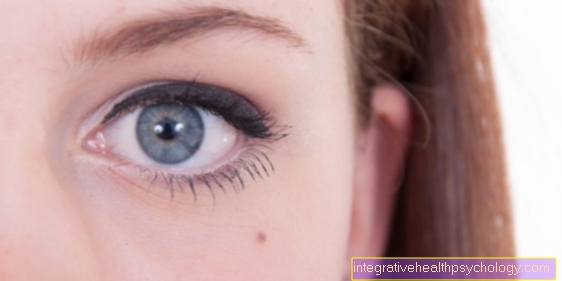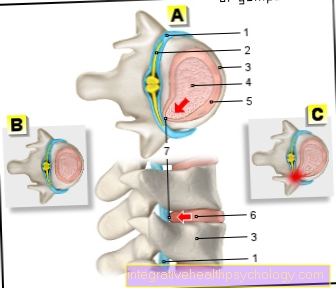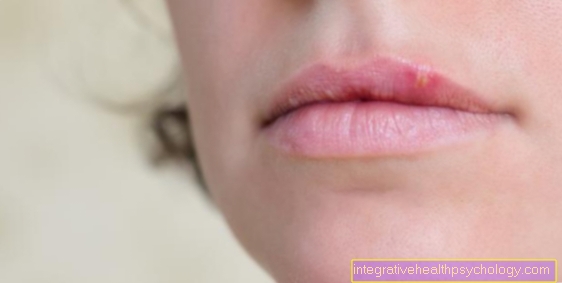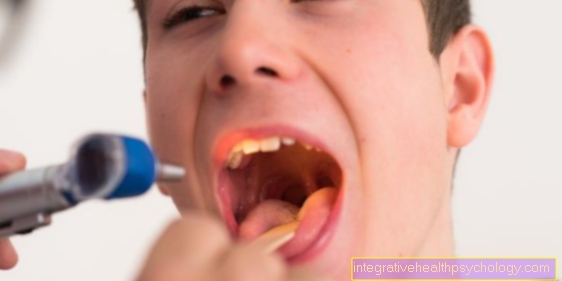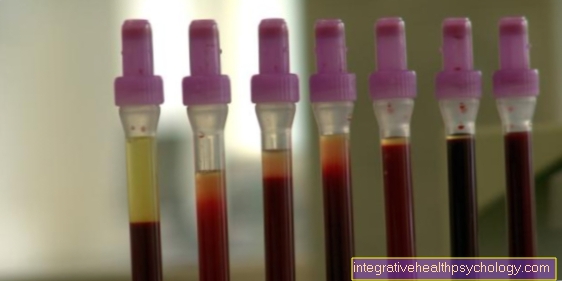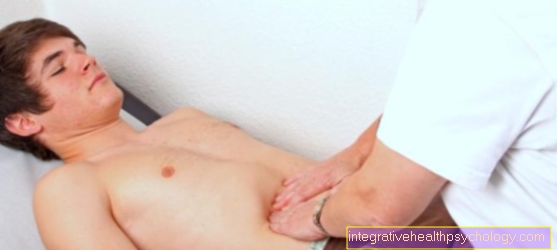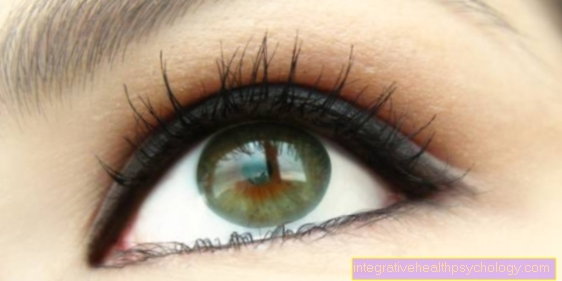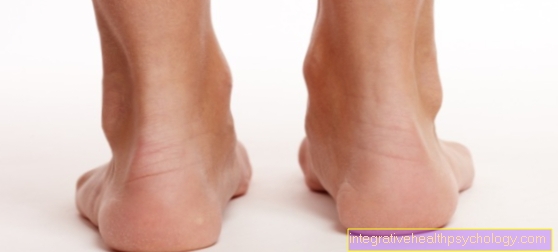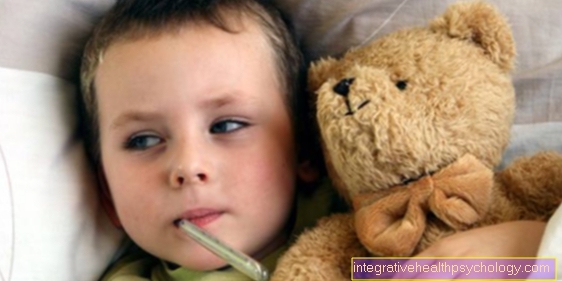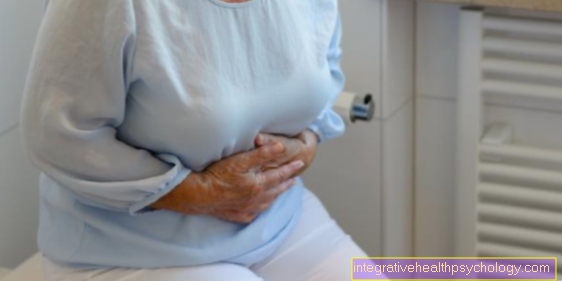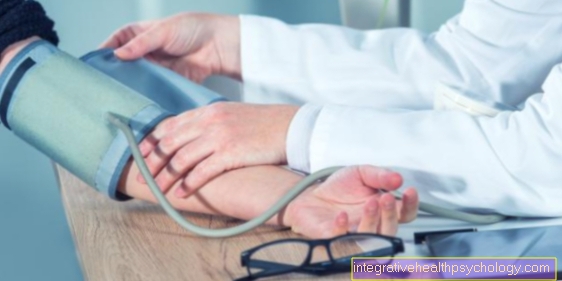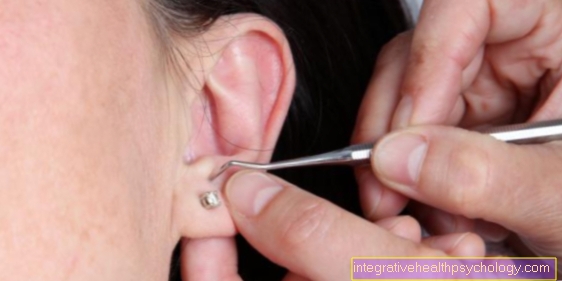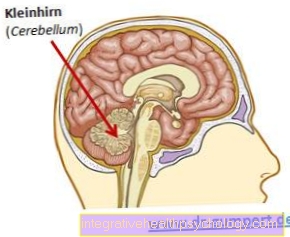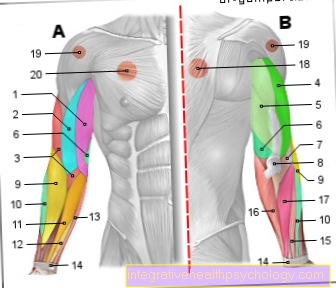Cracking in the chest
introduction
A crack in the chest can occur when stretching the upper body or when stretching after getting up in the morning.
Most patients feel the crackling near the sternum at the attachment point of the ribs or in the joint of the collarbone and sternum. A crack in the chest when stretching is harmless and does not indicate a serious illness.
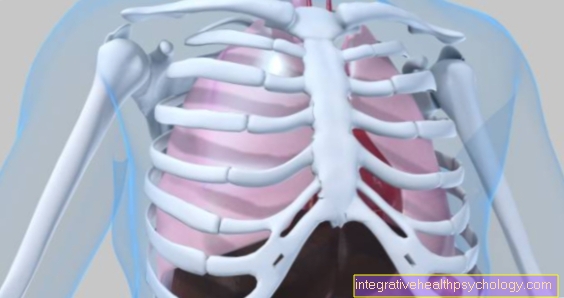
The most common causes
The most common cause of a chest crack is improper posture. This occurs especially in patients who work a lot while sitting at their desks and computers and position themselves incorrectly (e.g. rounded back or propped elbows). The wrong posture leads to incorrect strain on the muscles of the chest and restricted mobility of the joints between ribs and sternum. When stretching, these muscles are then stretched: the ribs to which they are attached are brought into position, the cramped posture is released and the movement in the joints creates a crack. Blockages in the cervical and thoracic spine can also cause the chest to crack.
To improve your posture, you might also be interested in: Exercises for strengthening and improving posture at the desk
diagnosis
The diagnosis is made because the patient is more likely to notice a crack in the chest and therefore see a doctor. After talking to the patient about their daily habits, sporting activities and preferred sitting posture, the doctor may suspect that the rib joints may be blocked. This suspicion can then be confirmed by a physical examination; imaging examinations such as ultrasound are not necessary in most cases. The diagnosis can also be made by a physiotherapist, chiropractor, or osteopath
Concomitant symptoms
Accompanying symptoms of cracking in the chest can be a feeling of pressure in the chest, back and neck pain. A feeling of pressure occurs especially in the front area of the sternum. Back and neck pain are a side effect of incorrect posture and are triggered by tense and hardened back muscles.
You might also be interested in: Chest pain
Painful cracking in the chest
Chest cracking can go along with pain. Some patients report that they experience increasing painful pressure in the chest and then having to stretch and stretch the chest and shoulders to release the crack to release the painful pressure. Also, the cracking in the chest itself can be painful because as it cracks the ribs move into position within the rib joints on the sternum, which can be painful for a moment.
What treatments and therapies are there?
The causes of cracking in the chest include improper posture, muscle tension and blockages in the cervical and thoracic spine. To treat the chest cracking it is important to maintain proper posture. Do not “hump” but make sure that your back and shoulders are straight. It is also helpful to switch to rucksacks instead of shoulder bags, because these distribute the load evenly over the back and do not favor the development of bad posture through a one-sided weight load. In addition, it makes sense to strengthen the back and shoulder muscles, which can be achieved through targeted back and shoulder training. In the case of severe pain in connection with the cracking in the chest, painkillers can be taken so as not to restrict mobility through pain-related relieving posture. If these tips do not help to relieve the cracking in the chest satisfactorily, physiotherapeutic, osteopathic and / or chiropractic therapy can be useful.
You might also be interested in: Exercises for back pain
Duration / forecast
It is difficult to make a generally valid statement about the duration of cracks in the chest. Some patients only occasionally have a crack in the chest, others very often. In some patients the problem goes away on its own, in others the frequency of the cracking increases. The prognosis for cracking in the chest is good. If caused by improper posture, there is no underlying malignancy or serious illness and can be improved by strengthening muscles and maintaining correct posture.
When does the cracking occur?
Cracking in the chest when stretching
Chest cracking usually occurs when stretching arms after sitting in one position for a long time or when stretching after waking up. The reason for this is that when stretching, the ribs in the joints between the breastbone and ribs move and “jump” into the correct position. This alignment of the ribs causes the cracking in the chest as you stretch.
Crackling in the chest after bypass surgery
With bypass surgery, the sternum must be sawed open in order to operate on the heart. Then the parts of the sternum are attached to each other with wires to stabilize it for the time it heals. However, it is difficult (for example because of the breathing movements) to completely immobilize the breastbone. Therefore, the chest may crack during the healing process. This usually settles when the bones have healed. However, if the sternum does not heal optimally, the cracking can occur for a long time after the bypass operation. A visit to the doctor is then advisable to clarify whether another operation is necessary.
Find out more about the topic here: The bypass surgery.
Cracking in the chest when sneezing
When sneezing, strong forces act on the chest. This can cause chest pain, but also a cracking sound, e.g. by ribs that have “jammed” or by vertebral blockages and now shifting against each other due to the sudden movement. If the cracking occurs in the chest when sneezing after a fall or accident, an injury to the ribs may be the cause of the cracking. The sudden movement of the chest causes the bones to rub against each other, causing them to crack.
Cracking in the chest after a bruise
Breathing-associated chest pain is common after a bruise in the chest area. The cause of the bruise can be many. The most common triggers are accidents (road traffic, sports, falls). As a result, bony lesions - mostly on the ribs - can develop.
If there is a cracking noise in the chest after such a bruise, a broken rib is suspected. This can cause more pain than the bruise alone and should be examined by a doctor due to various complications. The therapy takes place with painkillers and physical rest.
Cracking in the chest when coughing
When you cough, a lot of pressure builds up in your chest. This is needed to move small particles out of the lungs and airways. This pressure must be held by the bony chest. As a rule, this is not a challenge. However, if the thorax is weakened, the increased pressure when coughing can lead to a fractured rib. This can be noticed by a crack in the chest. Then there is typically pain in the affected rib area.

